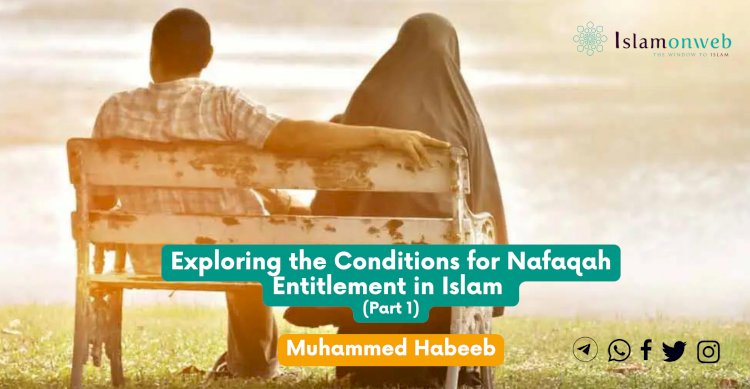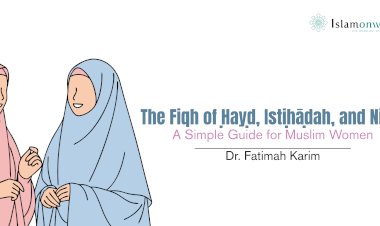Exploring the Conditions for Nafaqah Entitlement in Islam (Part 1)
Marriage is a sacred and pivotal institution in the Islamic faith, embodying divine wisdom and guidance, as articulated by Allah in His Holy Quran. Underscoring a divine intent behind the union of two souls, Allah the Almighty emphasized the role of marriage in fostering harmony, love, and mercy within society, saying: "And among His Signs is this, that He created for you mates from among yourselves, that ye may dwell in tranquility with them, and He has put love and mercy between your (hearts): verily in that are Signs for those who reflect."[1] The importance of marriage in Islam is further accentuated by the teachings of the Prophet Muhammad ﷺ. In one of his sayings, he illuminated the significance of marital life by highlighting four practices shared by the Messengers of God: modesty, the use of perfume, the use of the tooth-stick, and marriage.[2]
When two individuals come together in matrimony in Islam, they undertake a sacred commitment, but with it comes the responsibility of Nafaqah, which is an obligatory duty. Nafaqah refers to the financial maintenance and support that a husband is mandated to provide for his wife and their children. This obligation ensures that the family's material needs are met, allowing them to lead a dignified life in adherence to the tenets of Islam. The concept of Nafaqah has been the subject of extensive discourse among Islamic scholars, resulting in the establishment of specific provisions to govern it. In this chapter, we will delve into the intricate details of Nafaqah, examining its quantities, the perspectives of the four prominent schools of thought within Islam, and addressing the criticisms that have emerged in relation to this vital system of support. Through this exploration, we aim to gain a deeper understanding of the profound significance of Nafaqah within the context of Islamic marriage and family life.
Nafaqah in Islam
In Islam, Nafaqah stands as a cornerstone of familial responsibility. Rooted in the Quranic verses that emphasize a husband's duty to provide for his wife and family, Nafaqah is a commitment that extends far beyond mere financial support. Almighty God, in His infinite wisdom, has ordained the husband to bear the cost of their food and clothing on equitable terms, saying: “But he shall bear the cost of their food and clothing on equitable terms. No soul shall have a burden laid on it greater than it can bear.”[3]
Moreover, Islam, as a holistic way of life, recognizes the multifaceted needs of a family. Nafaqah encompasses not only the roof over their heads but also the clothes that shield them from harsh weather conditions. It extends to hygienic and cosmetic products that uphold personal well-being and self-esteem. Moreover, it encompasses the critical realm of healthcare, where a husband must ensure the medical needs of his wife and children are met. In essence, Nafaqah is a comprehensive commitment, a testament to the husband's obligation to provide for the well-being and dignity of his family in all aspects of life. However, the divine mandate for Nafaqah in Islam transcends its financial aspect. It is fundamentally about nurturing a family in a supportive, respectful, and harmonious environment. God's guidance reminds believers not to annoy them, so as to restrict them, saying: “Let the women live (in 'iddat) in the same style as ye live, according to your means: Annoy them not, so as to restrict them.”[4]
It is important to note that the obligation of Nafaqah persists even in the event of divorce, except in specific circumstances. If a wife has been divorced one or two times and her ‘iddah period has not ended, the husband remains responsible for providing her essential needs. However, if she has been divorced three times and her ‘iddah period is ongoing, the financial obligation ceases. Yet, even in this situation, if the wife is pregnant, the husband is duty-bound to ensure her essential needs are met, recognizing the added responsibility of caring for their unborn child.
In these nuanced rulings, we witness the intricacies of Islamic family law designed to ensure the welfare, dignity, and respect for all parties involved. Afterall, "Men are the protectors and maintainers of women, because Allah has given the one more (strength) than the other, and because they support them from their means."[5] However, an Islamic religious magistrate can intervene and grant a divorce at the wife's request if her husband refuses to fulfill his Nafaqah obligations, as Imam Abu Busair reported a hadith from Abu Ja’far saying: Whoever has a woman and does not clothe her with something to cover her private parts, and feed her with something that strengthens her core, it is the duty of the imam to separate them.
Quantity of Nafaqah
The discussion over the quantity of nafaqah has always been a hot topic for Muslim jurists. The majority of jurists have concluded saying that it is undefined and thus whatever can the husband manage for himself and the family would be sufficient. It is based on the principle of Kifāyah, which refers to whatever is sufficient (i.e. kāfī) is what a husband is obliged. As a major gounding of this standpoint, jurists take the Quranic verse: وَعَلَى الْمَوْلُودِ لَهُ رِزْقُهُنَّ وَكِسْوَتُهُنَّ بِالْمَعْرُوفِ ( But he shall bear the cost of their food and clothing on equitable terms.) The verse here hasn’t defined any quantity, rather it ensured that the husband doesn’t take more burden on his shoulders than he can endure, saying: No soul shall have a burden laid on it greater than it can bear. Moreover, the hadith of the Prophet also accentuated it when Hind (r.a.) asked him regarding taking money from husband if he is not giving it, saying: خذي ما يكفيك وولدك بالمعروف (Take reasonably what is sufficient for you and your children).[6]
In contrast, there are some other jurists who support this stance that the amount of nafaqah has been defined. To these scholars, nafaqah is as per the condition of the husband. Mainly, they categorize the nafaqah in three types:
- If the husband is rich, he will have to give two [7]
- If the husband is poor, he only has to give one
- If the husband is of middle level, he will have to give one and half mudd.
If the husband is a slave, he has to give only one mudd to his wife even if he is rich. This is according to the school of shafi’. Allowing this thought of school would raise so many questions. One of the major points would be to decide the parameters to classify rich, poor and middle class in their respective class.
Nafaqah of Divorcee
The nafaqah of divorcee is obligatory during the time of ‘iddah, if the divorce is a revocable one. The four schools are joint in this statement. The schools also concur that a woman observing the ‘iddah following her husband's death is not entitled to maintenance, whether she is pregnant or not, except that the Shafi'i and the Maliki schools state If the husband dies, she is entitled to maintenance only to the extent of housing. In Shafi' school, if he separates from her while she is pregnant and dies, her nafaqah shall not cease. The Hanafi school observes if she is a revocable divorcee and the husband dies during the ‘iddah , her ‘iddah of divorce shall change into an ‘iddah of death, and her nafaqah shall cease, except where she had been asked (by count) to borrow her nafaqah and she had actually done so. In this case, the nafaqah shall not cease. Likewise, a woman observing ‘iddah' because of mistaken intercourse, doesn’t get nafaqah.
The schools differ regarding the nafaqah of a divorcee during the ‘iddah of an irrevocable divorce. The Hanafis observe that she is entitled to nafaqah even if she has been divorced thrice, whether she is pregnant or not, on condition that she does not leave the house provided by the husband for her to spend the period of ‘iddah . According to the Hanafi school, the rules which apply to a woman in an ‘iddah following the dissolution of a valid contract are the same as those which apply to a divorcee in an irrevocable divorce.
According to shafi’ and Hanbali schools, if she is not pregnant she is not entitled to nafaqah, and if pregnant, she is entitled to it. But the Shafi’s add that if she leaves the house of her ‘iddah without any necessity, her nafaqah shall cease. According to the Maliki school, if the divorcee is not pregnant, she shall not be entitled to any nafaqah except residence, and if she is pregnant she is entitled to her full nafaqah; it shall not subside even if she leaves the house provided for spending the ‘iddah , because the nafaqah is intended for the child in the womb and not for the divorcee.
Nafaqah Of Disobedient Wife
The schools agree that a disobedient wife is not entitled to nafaqah. But they differ regarding the extent of disobedience which causes the nafaqah to subside. As per the Hanafi school, when a wife confines herself to her husband's house and does not leave it except with his permission, she shall be regarded as 'obedient' even if she denies him her sexual company without any valid reason. Therefore, though such an act is Haram for her, it shall not cause her nafaqah to cease. Thus, the cause which entitles her to nafaqah, according to the Hanafis, is her confining herself to her husband's home, and her denial of her sexual company has no effect at all. This view of the Hanafi school is contrary to the view of all the other schools who agree that if a wife does not allow her husband free access to her person without any legal and reasonable excuse, she shall be considered 'disobedient' and shall not be entitled to any nafaqah. Here the Shafi’ further adds that her allowing him free access is not enough unless she comes forth and expresses herself to him in a submissive manner, saying: 'I surrender myself to you'.
If a wife is divorced while she is disobedient, she will not be entitled to maintenance; and if she is undergoing the ‘iddah of a revocable divorce and turns disobedient during this period, her maintenance shall cease; but on her changing to obedience, it shall resume from the date of his knowledge of her becoming obedient. If a wife leaves her husband's home without his permission or refuses to reside in a house which fits her status, she shall be considered 'disobedient' and shall not be entitled to maintenance according to all the schools. The Shafi’i and the Hanbali schools further add that if she goes out with his permission for his need, she shall be entitled to maintenance, and if she goes out not for his need, her maintenance shall cease even if he had granted her permission to do so.
According to shafi' and hanbali schools, she won't be entitled to nafaqah if she goes out to perform the obligatory Hajj pilgrimage. The Maliki, the Shafi’i and the Hanbali school state that an absent husband is similar to a husband present in regard to the rules of maintenance. Therefore, if an absent husband has any known assets, the judge shall order her maintenance to be paid from them, and if he does not possess such property,the judge shall pass an order of maintenance against him and the wife will borrow against his name. This is the procedure followed in Egypt[8] .
In general, the husband will be free from giving nafaqah in certain situations.
- Disobedience of wife: If she doesn’t accept his orders and doesn’t go where he tells her, she won’t be entitled to nafaqah.
- Cancellation of nafaqah: It is the freeing of the wife and the husband from the past nafaqah. So he will be freed from the past nafaqah.
- Irrevocable divorce: If the husband divorced his wife three times, she won't be entitled to nafaqah unless she is pregnant.
A minor wife with no capability of intercourse will not be entitled to nafaqah. If the wife is a major capable while the husband is a minor incapable of it, the Hanafi, Shafi’, Hanbali schools observe that her nafaqah is obligatory, because the wife has no role in his incapability.
Nafaqah of Working Woman
If the woman is working and gets a salary, she will be entitled to nafaqah if her work is with the acceptance and consciousness of her husband. So she will not be entitled to nafaqah, if she is working without the knowledge of her husband. Even, the quantities will differ according to the situations. Islam doesn’t compel a woman to take the expenses of her house, whether she is rich or working.
According to Shafi' and Hanbali, a working woman won't get nafaqah. Because in their concept what makes the nafaqah obligatory is making them empowered. So by going to work the empowerment will be fullfilled and the husband will be free from giving her nafaqah.
Endnotes
[1] Holy Quran: 30/21
[2] Sunan al-Turmudi: 3/383
[3] Holy Quran: 02/233
[4] Holy Quran: 65/06
[5] Holy Quran: 04/34
[6] Sahih al-Bukhari 7180, b.93, h.43
[7] In modern day measurements, one mudd equates to approximately 775ml.
[8] al-'Ahwal al-shakhsiyyah, Abu Zuhrah
Disclaimer
The views expressed in this article are the author’s own and do not necessarily mirror Islamonweb’s editorial stance.
1 Comments
-

-

Author
1 year ago
Thanks❤
-
























Leave A Comment